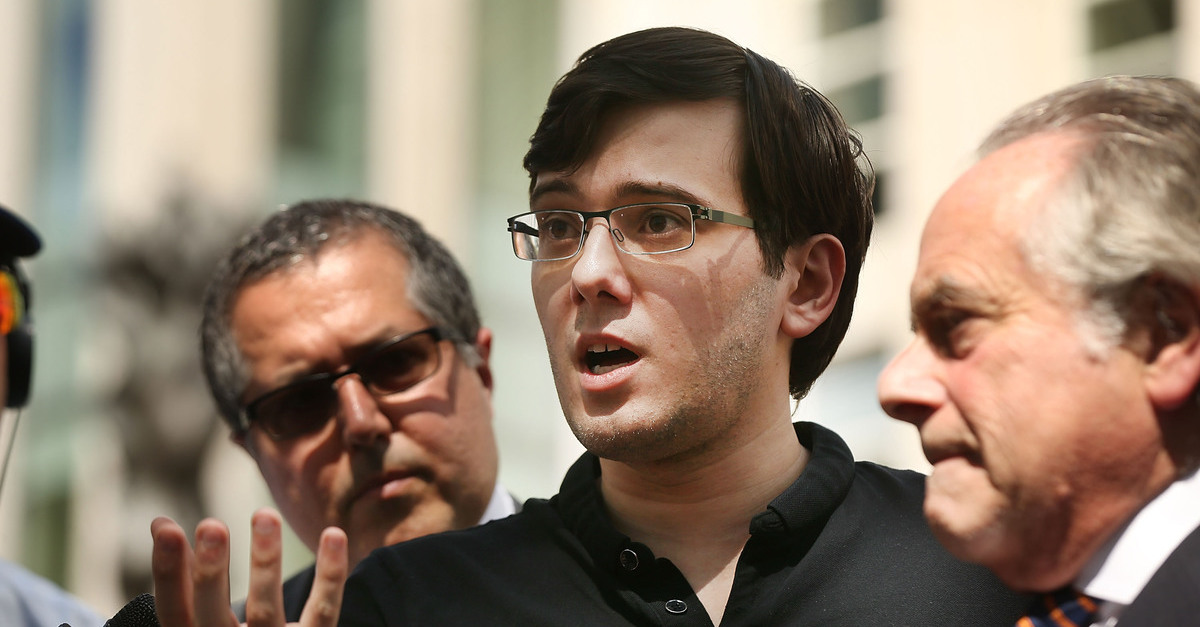
Ex-pharmaceutical executive Martin Shkreli speaks to the press in front of U.S. District Court for the Eastern District of New York with members of his legal team after the jury issued a verdict on Aug. 4, 2017.
A federal judge issued a scathing order against so-called “Pharma Bro” Martin Shkreli “banning him for life from participating in the pharmaceutical industry in any capacity.” Shkreli also must pay a $64.6 million disgorgement to states that filed an antitrust suit against him.
“Banning an individual from an entire industry and limiting his future capacity to make a living in that field is a serious remedy and must be done with care and only if equity demands,” U.S. District Judge Denise Cote noted in a 135-page ruling. “Shkreli’s egregious, deliberate, repetitive, long-running, and ultimately dangerous illegal conduct warrants imposition of an injunction of this scope.”
“Heartless and Coercive”
In January 2020, New York State Attorney General Letitia James (D) filed a lawsuit—which was later joined by the Federal Trade Commission (FTC) and attorneys general from other states—accusing Shkreli of exerting monopoly control to jack up the price of the life-saving drug, Daraprim.
“The Daraprim scheme was particularly heartless and coercive,” Judge Cote wrote. “Daraprim must be administered within hours to those suffering from active toxoplasma encephalitis.”
Judge Cote’s ruling describes how Shkreli cornered the market on the drug through a company then known as Turing Pharmaceuticals, which was later rebranded as Vyera, the entity sued by regulators.
“From day one, Shkreli focused his new venture on acquiring sole-source drugs that were the gold standard treatment option for life-threatening diseases with a small patient population and inferior alternative treatments, with the intent to raise their prices, block generic competition, and reap extraordinary profits,” the ruling states.
His 40-fold hike of Daraprim’s price earned him national scorn—and a cult following for his unapologetic defense of his actions as a capitalist savvy.
“Moreover, in the face of public opprobrium, Shkreli doubled down,” Cote wrote. “He refused to change course and proclaimed that he should have raised Daraprim’s price higher.”
Shkreli was later criminally prosecuted, not for anything related to Daraprim, but for defrauding investors in a separate company named Retrophin, which led to a seven-year sentence on securities fraud convictions in 2018.
Accounting for his stint in pre-trial confinement, Shkreli is approaching the end of his prison sentence and is slated for release on Nov. 7 of this year. The lawsuit seeking his ban from the pharmaceutical industry hit federal court while Shkreli was behind bars.
“Without a lifetime ban, there is a real danger that Shkreli will engage in anticompetitive conduct within the pharmaceutical industry again,” the ruling states. “Shkreli established two companies, Retrophin and Vyera, with the same anticompetitive business model: Acquiring sole-source drugs for rare diseases so that he could profit from a monopolist scheme on the backs of a dependent population of pharmaceutical distributors, healthcare providers, and the patients who needed the drugs.”
“Recklessly Disregarded the Health of a Particularly Vulnerable Population”
Regulators claimed that not even incarceration inside the Federal Correctional Institution in Allenwood, Pennsylvania, could keep Shkreli from keeping prices for Daraprim—a critical tool in the fight against toxoplasmosis—sky high. Toxoplasmosis particularly afflicts people with compromised immune systems, such as people with HIV or who have received organ transplants.
“The context in which Shkreli conducted his schemes cannot be ignored,” Cote wrote. “He cynically took advantage of the requirements of a federal regulatory scheme designed to protect the health of a nation by ensuring that its population has access to drugs that are not only effective but also safe. He recklessly disregarded the health of a particularly vulnerable population, those with compromised immune systems. His scheme burdened those patients, their loved ones, and their healthcare providers.”
Citing reporting in the Wall Street Journal, regulators said that Shkreli exercised “shadow control” over Vyera and its Swiss corporate parent Phoenixus from behind bars.
Judge Cote found that the facts bore out that reporting.
“Shkreli initiated every anticompetitive decision that Vyera pursued to its conclusion,” the ruling states. “He maintained ‘shadow control’ of the company, staying in close contact with Vyera’s directors and officers, providing guidance on how to maintain control of the market, and threatening to use his authority as the largest shareholder to call an extraordinary general meeting (‘EGM’) that would install more pliant officers and directors. He did exactly that in 2017 and again in 2020, each time installing loyalists.”
The New York attorney general who sued Shkreli celebrated the court’s decision.
“Martin Shkreli is a ‘Pharma Bro’ no more,” James tweeted, hinting at the defendant’s lifetime ban. “A court found that the former Vyera Pharma CEO illegally monopolized the market of the life-saving drug Daraprim.”
#BREAKING: Martin Shkreli is a ‘Pharma Bro’ no more. A court found that the former Vyera Pharma CEO illegally monopolized the market of the life-saving drug Daraprim.
The powerful don’t get to make their own rules, despite Shkreli thinking cash rules everything around him.
— NY AG James (@NewYorkStateAG) January 14, 2022
“The powerful don’t get to make their own rules, despite Shkreli thinking cash rules everything around him,” James added.
Shkreli’s attorney Christopher H. Casey, from the firm Duane Morris, did not immediately respond to Law&Crime’s email requesting comment.
Read the ruling below:
(Photo by Spencer Platt/Getty Images)